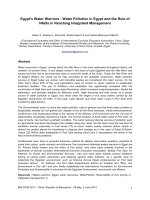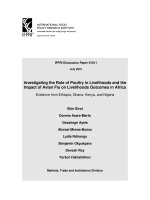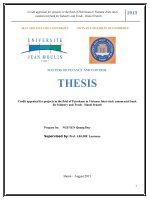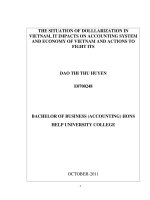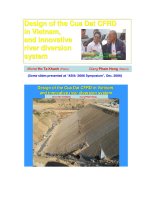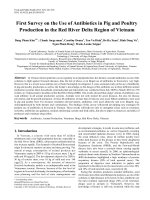The Overview of FLEGT in Vietnam and management orientation on forest products processing by 2020
Bạn đang xem bản rút gọn của tài liệu. Xem và tải ngay bản đầy đủ của tài liệu tại đây (234.3 KB, 20 trang )
“The Overview of FLEGT in
Vietnam and management
orientation on forest products
processing by 2020
Pham Ngoc Mau
Deputy Director, Bilateral Division
International cooperation Department
Ministry of Agriculture and rural Development of Vietnam
Content
• Forest area and forestry policy implementation
• Law violation, challenges and opportunities of
FLEG in Vietnam
• Management orientation on forest products
processing
• Supports and Steps forwards VPA
Forest area legal framework
• Total forestry land of Vietnam is 12.616.699 ha
Forest Cover is 38% by the end of 2006 as
opposed to 26% in 1994.
• Forestland is an important resource of the 24 mil
upland people.
• FLA has been implemented since 1994 to HH,
individuals and organizations for long-term and
stable uses in order to improve their lives,
promote forest protection and development.
Result of forest policy implementation
•
•
•
•
Encourage HHs to exploit and utilize appropriately forest resources
and to protect and restore the degrading forest.
Contribute to hunger eradication and poverty reduction and to reduce
shifting cultivation
Develop production forest and proceed to the well-being with forest
economy.
In short:
lives of people improved;
weariness on the role of forest improved;
forest cover increased;
resettlement increased; and
forest is sustainably managed
Some constraints
• Policy implementation at local level is still ineffective due
to:
Lack of capacity of local authorities in implementation process
Overlapping in management and implementation between
DARDs an DONREs upon mapping system criteria;
demarcation is difficult on the ground; and
land disputes and uses increased.
• Forest management and protection, especially forest &
forest land allocation subject to regulation of 2 laws: land
law regulating land allocation; Forest protection and
development law regulating forest allocation. Resulting in
inconsistent policies and difficult for the implementation
Constraints (cont'd.)
• Lack of mechanism for monitoring and evaluation of
policy implementation
• Benefit sharing on forest allocation and contract is not
explicit
• Capacity of forest owners regarding forest management
and protection is insufficient
• Forest protection forces in general and forest wardens in
particular could not control the situation in some areas
• Gaps between national and customary laws
• Role of non-state sector is less attention
• Local people have poor access to legal information
• Missing policy on PES
The current status of law violations
• The most serious violation is the forest fire for
shifting cultivation, caused by the ethnic groups that
have the habit of free migration
• Illegal trade of forestry products were conducted
mostly by rich people
• The punishments of violations related forest burning
were not strict so the people consider forest burning
as normal activity.
• The law violations in forest protection and
management are very popular with characterized
with complicated facts and elements.
• The forest resources are over exploited, the new
forest plantations cannot catch up with the intensive
illegal logging and destruction
Challenges of FLEG in Vietnam
• Too much state control over forest resources
and poor compensation for local people
• Inadequate attention to indigenous knowledge
• Migrants as additional appropriators of the
resources
• Unclear benefit sharing mechanism for allocated
forest
• Improper implementation of state policies
• Upward accountability of (local) state officials
Opportunities for FLEGT in Vietnam
• Inherit the precious experiences and lessons from other
countries
• Many supports from outside (International Aid) for
FLEGT process
• Promotion of meaningful devolution of forest
management to ethnic villages
• Promotion of community forest management (CFM)
• Development of a pro-poor approach in forestry
• Promotion of understanding and recognition of local land
tenure system among state officials
Management orientation on forest
products processing by 2020
Processing Situation in Vietnam
Wood processing sector important, in particular outdoor
furniture for export
Ambitious expansion plans
Currently based to large extent on timber imports
Plans to decrease dependence on timber imports
Increased efforts for law enforcement
Vietnam Furniture Status
• 1600 Wood & furniture factories export to 120
countries.
• Factories distribution:
– Concentrated in HCMC, Binh Duong, Dong Nai, Binh
Dinh, Daklak, & Quang Nam – Da Nang.
– 10% in Northern VN.
• Foreign investment:
– 200 FDI Companies contribute 56% to the furniture
export.
Source: Vietnamese – German Forestry Programme
Furniture export from Vietnam
Source: VN’s handicraft & furniture news
Vietnam timber processing and import
Source: VN’s handicraft & furniture news
Orientation development of timber & forest products
processing by 2020 – National Strategy for Forestry Development by 2020
•
Competitive & sustainable timber and wood products to basically
meet domestic and export demands;
•
Forest production value growth speed will be 4 - 5%/year, by 2020,
forestry GDP will contribute to 2 - 3% of the national GDP.
•
Fire-wood exploitation used in rural area is at the level of 25 - 26
million m3/year;
•
Forest products export obtains over 7.8 billion USD (incl. 7 bil.USD
of timber products and 0.8 bil.USD of NTFP);
•
Processing industry & forest products trade have to be the
economic driving force of the forestry sector
•
Focus on quality development via innovative managerial
mechanism, reform of state owned enterprises and encouragement
of private participation so as to create more transparent and fairplay markets
Orientation development of timber & forest products
processing by 2020 (Cont.)
•
Focus on development of high competitive producxts as indoor and
outdoor furniture, handicraft and NTFP products (bamboo, rattan).
•
From now to 2015, focus on revision, improvement and upgrading
small and medium processing enterprises; develop large-scale after
2015
•
Establish and extent forest products processing industry to other
regions that have potentiality for supplying stable and sufficient inputs,
to ensure benefit generation and competability on international
markets.
•
Develop and modernize small-scale processing enterprises &
traditional handicraft villages at rural areas so as contribute to the
diversification of agricultural and rural economic
•
Encourage establishment of production and processing units involved
in plantation timber & NTFP production.
Forest products import – export orientation
•
To be in line with the international integration trend, forest products
processing industry shall develop towards the direction of inputs
based self-sufficient.
• It is important to properly organize import of forest materials and at
the same time to strengthen plantation of large wood and NTFP
species in order to gradually satisfy materials for processing and
reduce dependence on imported materials while increasing added
value of the processed products.
• Key export products are indoor and outdoor furniture, handicrafts
and NTFP refinery products. Due attention should be paid on large
markets as US, EC and Japan.
• Diversification and constantly increasing quality, products label to
meet the taste of both national and international clients. Enhance
establishment of trade mark and certification for export products
Supports and Steps forwards VPA
1.
EC/WB FLEG work in Vietnam
•
•
•
•
Survey of customs import data (VIFORES)
Survey of perceptions of forest crime across judiciary and police
National FLEG assessment (ongoing)
Wood processing survey (ongoing)
•
Enforcement training
– forest crime investigation training
– case tracking & intelligence database development
– inter-agency cooperation
•
•
Customs and FPD study tour
GIS/spatial technologies video-conference seminars
2.
EC/IUCN Forest governance project
I.
Conducted the assessment of forest governance barriers
influencing sustainable and equitable forest management
II.
FLEGT briefing session
Raise awareness of the relevant government officials about FLEG
in general and EU‘s FLEGT action plan.
III.
Vietnam – EC Roundtable meeting on market demands for legal
and sustainable wood products
About 60 participants from:
Vietnamese government agencies
National and international forest produc companies
Certification bodies
NGOs and donor programmes
Contents:
•
•
•
•
Background to Vietnam’s forest sector and major
forest governance-related initiatives (FLEG, FLEGT)
Changing market trends and the industry response
Linking responsible producers with markets
Demonstrating the legality and sustainability of timber
Voluntary Partnership Agreements’ Issues
• Actual costs of preparation, negotiation and
implementation unclear
– will vary between countries
• Not only for producer countries
– can be adapted for processing countries
• Not only for timber, sawn wood, plywood, veneer
– product range up to partner countries based on potential
benefits
• Time frame for negotiations
– ‘new’ countries can learn from experience of ongoing
negotiations
Is very important step of the process
Vietnam needs support from EC to
develop FLEG roadmap
